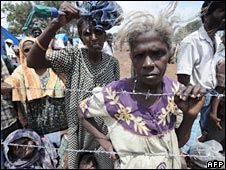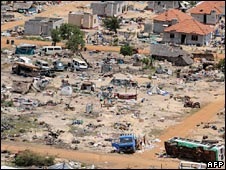UN Secretary General Ban Ki-moon spent Saturday in Sri Lanka pressing for political reconciliation and full humanitarian access for displaced people in camps, following Colombo’s declaration of victory over Tamil Tigers rebels.
The BBC’s UN correspondent Laura Trevelyan was travelling with Mr Ban and sent this report.
 The Menik Farm camp in northern Sri Lanka has a distinctly military air for a place which is housing more than 200,000 people displaced by the fighting.
The Menik Farm camp in northern Sri Lanka has a distinctly military air for a place which is housing more than 200,000 people displaced by the fighting.
There is barbed wire everywhere, and camouflage-clad soldiers who are not at all keen on journalists speaking to those inside the camp.
As Mr Ban arrived amid a cloud of dust generated by his helicopter to see for himself the conditions in which people are living, there was an official welcome. Next came a presentation by Sri Lankan officials, about how well run the camp is.
Screening
Yet there is clearly overcrowding here. Greson Brando, from the UN’s office for the Co-ordination of Humanitarian Affairs, explained that on one plot of land more than 74,000 people were living in a space designed for half that number.
Mr Ban came to press the Sri Lankan government to allow the UN and aid agencies full humanitarian access to the camps and to call for those inside to have freedom of movement.
The Sri Lankan government will not let the mostly Tamil people here leave yet.
They are screening them to make sure they are not a security risk (i.e. Tamil Tigers who might begin to fight again).
The UN says people must be allowed to reunite with their families. Sri Lanka’s Foreign Minister Rohitha Bogollagama told me the screening process is on course and when it is over the resettlement will begin.
What about allowing agencies full access to people here, I asked Mr Bogollagama.
"You can see how much humanitarian access people are enjoying," answered. "People here were denied their basic human rights by the LTTE [Tamil Tigers]."
Malnourished patients
Mr Ban was serenaded by well turned out children waving Sri Lankan flags. The camp floor was neatly swept, there were flowers in the gardens. A huge sign welcomed Mr Ban "to our motherland".
Yet there was no disguising the agony here.
Women spoke of walking through water to escape the fighting, being shelled from both sides, by the government and the Tamil Tigers.
In a makeshift hospital Mr Ban saw elderly, malnourished patients lying on cot beds in the open air, drips attached, flies buzzing round their heads. A few looked close to death.
Mr Ban was clearly moved by what he saw, describing himself as saddened and humbled.
He praised the Sri Lankan government for the help it is providing, while saying it lacked capacity – diplomatic code that more can be done.
‘Vision of hell’
From the camp we were off by helicopter once again – this time to see the conflict zone itself – by Mullaitivu.
We were the first international journalists to see the scene of the final days of the fighting.
The tiny spit of land in north-eastern Sri Lanka could be a beach paradise. Instead it is like a vision of hell.
Houses have been destroyed, buses blown up, palm trees devastated, and there are craters in the beach. On the sand I saw row after row of tents.
 People lived in these cramped conditions, allegedly used by the Tamil Tigers as a human shield while the Sri Lankan military closed in.
People lived in these cramped conditions, allegedly used by the Tamil Tigers as a human shield while the Sri Lankan military closed in.
Mr Ban did not land and look around the conflict zone. As a guest of the Sri Lankan authorities, he was well aware of the risk of being used by the government to portray international support for their military victory.
So he flew over instead, looking from the safety of the sky.
Joint statement
From there, Mr Ban went on to meet President Rajapaksa. UN officials were hoping to underline with him the importance of winning the peace as well as the war, by reaching out to Tamils and giving them rights in a comprehensive political settlement.
"If issues of reconciliation and social inclusion are not dealt with, history could repeat itself," warned Mr Ban.
The two men issued a joint statement after their meeting.
On the situation in the camps, the statement said the government would continue to provide access to humanitarian agencies, which did not acknowledge that it was not quite doing that.
President Rajapaksa says he will begin talks with all parties – including the Tamils – to bring about lasting peace.
(For updates you can share with your friends, follow TNN on Facebook and Twitter )
